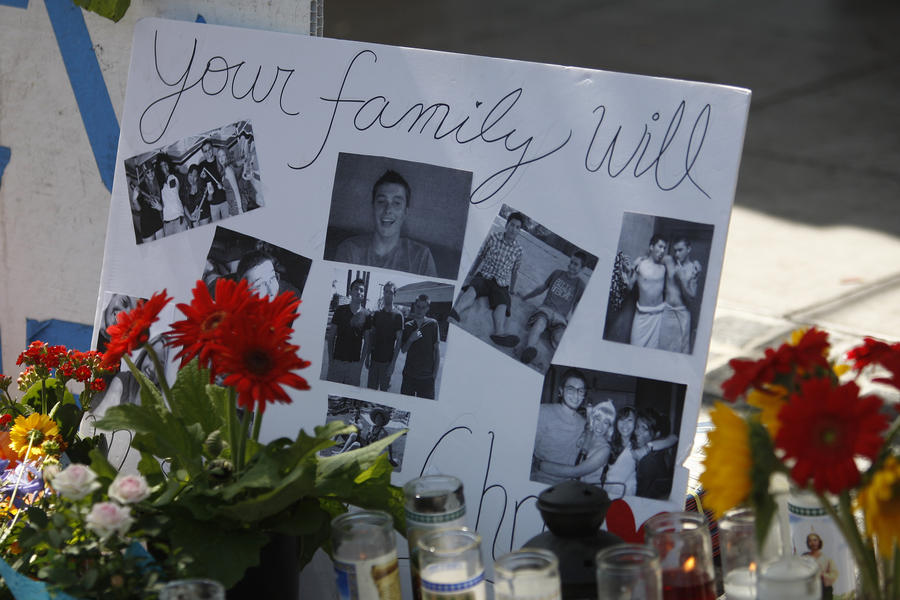Elliot Rodger could not be stopped because 'being sad is not a crime'
David McNew/Getty Images


A free daily email with the biggest news stories of the day – and the best features from TheWeek.com
You are now subscribed
Your newsletter sign-up was successful
In the wake of the Isla Vista shooting on Friday that left six people dead and 13 injured, the Los Angeles Times offers thoughtful analysis on why 22-year-old alleged shooter Elliot Rodger was able to avoid police intervention.
Rodger, his family says, was somewhere on the autism spectrum. And yes, he had been in therapy since he was a child. He had also become increasingly isolated after his 18th birthday, rejecting the mental health care his family provided. And yes, he was even recently questioned by police after an altercation with UC Santa Barbara students that left him with an injured ankle. But officials say there was nothing about the incident that would have prompted authorities to follow up with Rodger. And therein lies the problem.
Critics say the teenager left plenty of clues. But, despite Rodger's troubles, the lonely young man simply flew under the radar, appearing to his peers as only terribly sad. The Los Angeles Times continues:
The Week
Escape your echo chamber. Get the facts behind the news, plus analysis from multiple perspectives.

Sign up for The Week's Free Newsletters
From our morning news briefing to a weekly Good News Newsletter, get the best of The Week delivered directly to your inbox.
From our morning news briefing to a weekly Good News Newsletter, get the best of The Week delivered directly to your inbox.
And being sad is not a crime, nor the sort of mental state that would, alone, cross a legal threshold requiring official response.The mental health system is imperfect, by design — a teeter-totter that weighs patients' civil liberties against public safety. Rodger existed in the middle, on the fulcrum, simmering and disturbed, just beyond arm's reach.
In that quiet space he planned his attack — lonely, but highly functioning; worrisome, but never explicitly threatening himself or anyone else; bumping into police, but never landing in jail; resistant to medication, but never outright rejecting care; able to articulate his misery, but conniving enough that authorities did not see a need for involuntary hospitalization. [Los Angeles Times]
Simply put: There was nothing in Rodger's background to prevent him from purchasing a weapon.
A free daily email with the biggest news stories of the day – and the best features from TheWeek.com
Lauren Hansen produces The Week’s podcasts and videos and edits the photo blog, Captured. She also manages the production of the magazine's iPad app. A graduate of Kenyon College and Northwestern University, she previously worked at the BBC and Frontline. She knows a thing or two about pretty pictures and cute puppies, both of which she tweets about @mylaurenhansen.
-
 Political cartoons for February 15
Political cartoons for February 15Cartoons Sunday's political cartoons include political ventriloquism, Europe in the middle, and more
-
 The broken water companies failing England and Wales
The broken water companies failing England and WalesExplainer With rising bills, deteriorating river health and a lack of investment, regulators face an uphill battle to stabilise the industry
-
 A thrilling foodie city in northern Japan
A thrilling foodie city in northern JapanThe Week Recommends The food scene here is ‘unspoilt’ and ‘fun’
-
 ABC News to pay $15M in Trump defamation suit
ABC News to pay $15M in Trump defamation suitSpeed Read The lawsuit stemmed from George Stephanopoulos' on-air assertion that Trump was found liable for raping writer E. Jean Carroll
-
 Judge blocks Louisiana 10 Commandments law
Judge blocks Louisiana 10 Commandments lawSpeed Read U.S. District Judge John deGravelles ruled that a law ordering schools to display the Ten Commandments in classrooms was unconstitutional
-
 ATF finalizes rule to close 'gun show loophole'
ATF finalizes rule to close 'gun show loophole'Speed Read Biden moves to expand background checks for gun buyers
-
 Hong Kong passes tough new security law
Hong Kong passes tough new security lawSpeed Read It will allow the government to further suppress all forms of dissent
-
 France enshrines abortion rights in constitution
France enshrines abortion rights in constitutionspeed read It became the first country to make abortion a constitutional right
-
 Texas executes man despite contested evidence
Texas executes man despite contested evidenceSpeed Read Texas rejected calls for a rehearing of Ivan Cantu's case amid recanted testimony and allegations of suppressed exculpatory evidence
-
 Supreme Court wary of state social media regulations
Supreme Court wary of state social media regulationsSpeed Read A majority of justices appeared skeptical that Texas and Florida were lawfully protecting the free speech rights of users
-
 Greece legalizes same-sex marriage
Greece legalizes same-sex marriageSpeed Read Greece becomes the first Orthodox Christian country to enshrine marriage equality in law
